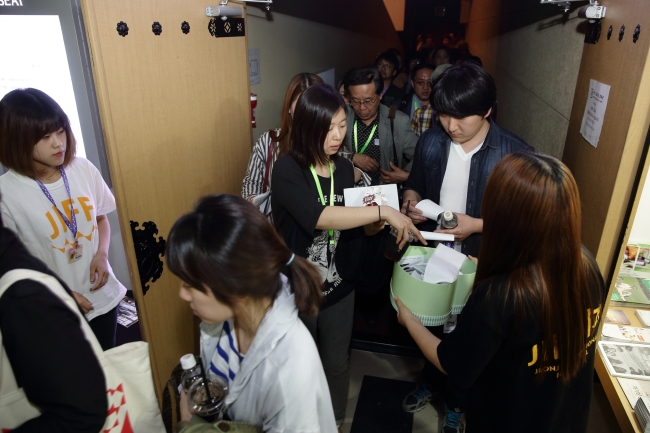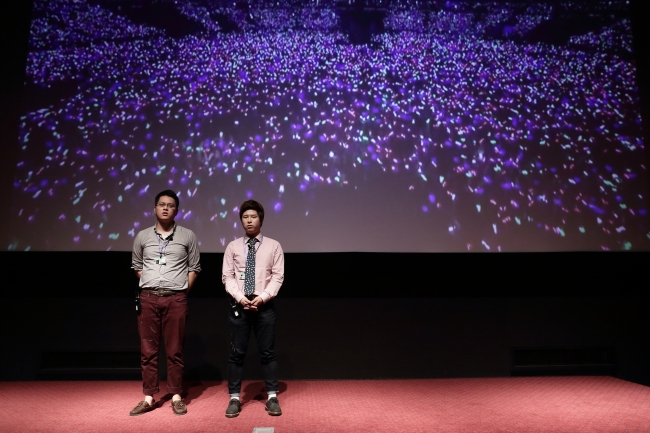JEONJU, North Jeolla Province ― Aside from film screenings and talk sessions with cineastes from all over the world, one of the most exciting events at Jeonju International Film Festival is Jeonju Project Market, during which local filmmakers pitch their latest film projects to potential investors and distributors.
On May 3, a total of 10 selected filmmakers made presentations at the Jeonju Digital Independent Cinema in Jeonju, with some 300 industry figures attending, including those from Lotte Entertainment, Showbox, Woori Investment and Union Investment Partners.
There were two different sessions: one for feature film projects, and the other for documentaries. The top prize winners were to receive 10 million won ($9,800) in prize money as production funds, a 50 percent discount for utilizing camera equipment and a studio, and support for creating English subtitles.
 |
Viewers vote for the best pitch at Jeonju Project Market on May 3. (JIFF) |
A total of five filmmakers competed for feature film projects. Their pitches were, arguably, not as original as those made by documentary filmmakers. Director Park Jong-keun’s “Baby Rose,” which won the top prize, is about a pastor who was unfairly imprisoned for many years for a crime he never committed after being falsely accused by the police, who were pressured by the authoritarian Korean government in the 1960s.
The project is reminiscent of Park Chan-wook’s “Oldboy,” about a man who is imprisoned in a hotel room for 20 years without knowing who his captors are or their motives, as well as “The Attorney,” about late president Roh Moo-hyun’s earlier days as a Busan-based human rights lawyer fighting against the authoritarian Korean government in the early 1980s.
Director Jude Jung’s project “Perfect Neighbors,” which won two prizes ― the TV4MONDE award given by the French broadcaster and the Audience Award ― is a comic crime thriller which features two upper class families whose teenage sons together commit a hit-and-run.
Their highly respected fathers, one a medical doctor and the other a renowned writer, and their spouses try to come up with a plan to save their reputation by somehow hiding their children’s crime, but eventually get into a series of arguments as their interests conflict.
Although Jung’s presentation was highly entertaining ― perhaps that’s why she won the Audience Award ― her project also didn’t show much originality. It is very similar to Roman Polanski’s 2011 film “Carnage,” a comedy about two upper-class married couples who meet after their children get into a fight at school. The couples’ selfishness and vanity eventually lead to chaos in the film.
JPM’s documentary pitch session also featured five filmmakers and their projects, which all dealt with socially conscious matters with engaging real-life characters. Three out of five projects were shot outside Korea. They were set in Australia, China and Japan, among other locations.
Director Lee Dong-han’s project “A Big Day,” which won the top prize in the documentary category, deals with a man who is paralyzed due to a muscular disease. The project also follows his caregiver, who is a Filipino woman and illegal immigrant working in Korea to support her family back home.
“While the man is paralyzed physically, his caregiver is also paralyzed in the sense that she can’t leave this country (as she can’t return once she leaves),” the director said during his presentation.
Director Jero Yun’s project “Leaving Homeland,” which won the Audience Award, deals with a North Korean defector who was sold to a Chinese man as his wife. Although their relationship started with money, she soon fell for her kind husband. The film follows her life-threatening journey from her husband’s rural Chinese town to South Korea ― she wishes to marry him in Seoul legitimately after acquiring her South Korean citizenship. Director Yun followed her from China to Thailand to South Korea, and reportedly was briefly arrested along with the woman in Thailand.
 |
Filmmaker Joey Ye-hwan (right) makes a presentation about his documentary project “ROCK U” at Jeonju Project Market’s documentary pitching session on May 3. (JIFF) |
Filmmaker Lee Hee-won’s project “Holy Working Day” is about modern young Koreans who work at a farm in Australia on a working holiday visa in a bid to build their careers and learn English. Hwang Cheol-min’s project “Jung Jomun’s Pot” seeks to follow the life of Jung Jo-mun (1918-1989), the late ethnic Korean in Japan who founded Kohyo Museum in Kyoto with some 1,700 Korean antiques he collected over three decades. Director Joey Ye-hwan’s “ROCK U,” on the other hand, documents the local indie music scene in Korea, paying special attention to three indie rock bands.
First established in 2009, JPM has financed a number of successful projects including “A Dream of Iron” by Park Kyung-kun, which won the NETPAC Award for Best Asian Film at this year’s Berlinale.
JIFF runs until May 10.
By Claire Lee (
dyc@heraldcorp.com)









![[From the Scene] At this Starbucks, you need ID: Franchise opens store with view of North Korea](http://res.heraldm.com/phpwas/restmb_idxmake.php?idx=644&simg=/content/image/2024/11/29/20241129050068_0.jpg)